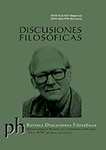Autores/as
Resumen
La interpretación de la teoría de la acción de Aristóteles ha tendido recientemente hacia una postura intelectualista, según la cual la razón está a cargo de establecer los fi nes de las acciones. Un resurgimiento del anti-intelectualismo, según el cual establecer los fi nes es tarea del carácter y no de la razón, ha puesto esta postura bajo crítica. Este ensayo sostiene que ninguna de las dos interpretaciones puede dar cuenta suficiente de las complejidades de la teoría de Aristóteles, y sugiere un camino intermedio que combina las fortalezas de ambas, evitando a la vez sus difi cultades. El problema crucial del intelectualismo es que Aristóteles asevera explícitamente que la razón no puede establecer los fines de la acción. El problema crucial del antiintelectualismo es que él también afi rma que la parte racional del alma debe guiar y gobernar la parte irracional. Bosquejo aquí el intelectualismo indirecto, una propuesta intermedia prometedora.
Citas
___. (2017). Do we reflect while performing skillful actions? Automaticity, control, and the perils of distraction. Philosophical Psychology, 30(7), 896–924. Print.
___. (Forthcoming). The politics of care: How reason shapes character in Aristotle’s polis.
Broadie, S. (1991). Ethics with Aristotle. Oxford University Press. Print.
Boeri, M. D. (2008). “Todo el mundo lleva a cabo lo que le parece bien. Sobre los trasfondos socráticos de la teoría aristotélica de la acción.” Revista Philosophica 33, 7-26. Impreso.
Burnyeat, M. F. (1980). “Aristotle on learning to be good”. In Essays on Aristotle's Ethics (ed. Rorty, A. O.). University of California Press, 69-92. Print.
Carbonell, C. (2013). “Phantasía logistikē en la configuración del deseo en Aristóteles.” Ideas y Valores 62: 152, 133-158. Impreso.
Cooper, J. M. (1975). Reason and human good in Aristotle. Hackett. Print.
Destrée, P. (2011). “Aristotle on responsibility for one's character”. In Moral Psychology and Human Action in Aristotle (ed. Pakaluk, M. & Pearson, G.). Oxford University Press, 285-318. Print.
Fortenbaugh, W. W. (1964). “Aristotle's conception of moral virtue and its perceptive role.” Transactions and Proceedings of the American Philological Association 95, 77-87. Print.
Frede, D. (2013). “The political character of Aristotle's ethics”. In The Cambridge Companion to Aristotle's Politics (ed. Deslauriers, M. & Destrée, P.). Cambridge University Press, 14-37. Print.
Frede, M. (1992). “On Aristotle's conception of soul”. In Essays on Aristotle’s de Anima (ed. Nussbaum, M. C. & Rorty, A. O.). Clarendon Press, 93-107. Print.
Gauthier, R. A. & Jolif, J. Y. (1970). Aristote: L'Ethique á Nicomaque. Publications Universitaires de Louvain. Impreso.
Gómez Espíndola, L. L. (2015). “De la posibilidad a la necesidad en el ámbito de la acción: Sopesando las lecturas deterministas e indeterministas de Aristóteles.” Ideas y Valores 64: 158, 169-197. Impreso.
Grönroos, G. (2015). “Wish, motivation and the human good in Aristotle.” Phronesis 60: 1, 60-87. Print.
Hämäläinen, H. (2015). “Aristotle on the cognition of value.” Journal of Ancient Philosophy 9: 1, 88-114. Print.
Irwin, T. H. (1975). “Aristotle on reason, desire, and virtue.” The Journal of Philosophy 72: 17, 567-578. Print.
Jiménez, M. (2015). “Aristotle on ‘Steering the young by pleasure and pain’.” The Journal of Speculative Philosophy 29: 2, 137-164. Print.
Labarrière, J.-L. (1997). “Désir, phantasia et intellect dans le De anima, III, 9-11: Une réplique à Monique Canto-Sperber.” Les Études philosophiques, 97-125. Print.
Lennox, J. G. (1999). “Aristotle on the biological roots of virtue”. In Biology and the Foundations of Ethics (ed. Maienschein, J. & Ruse, M.). Cambridge University Press, 405-38. Print.
Leunissen, M. (2012). “Aristotle on natural character and its implications for moral development.” Journal of the History of Philosophy 50:4, 507-530. Print
Liu, W. (2012). “Creating character: Aristotle on habituation, the cognitive power of emotion, and the role of prudence.” Frontiers of Philosophy in China 7:4, 533-549. Print.
López Gómez, C. (2009). “Inteligencia animal en Aristóteles.” Discusiones Filosóficas 10, 69-81. Impreso.
McDowell, J. (1998). “Some issues in Aristotle's moral psychology”. In Mind, value, and reality (ed.). Harvard University Press, 23-49. Print.
Meyer, S. S. (2016). “Aristotle on moral motivation”. In Moral motivation: a history (ed. Vasiliou, I.). Oxford University Press. Print.
Moss, J. (2011). “‘Virtue makes the goal right’: Virtue and phronesis in Aristotle's ethics.” Phronesis 56:3, 204-261. Print.
___. (2012). Aristotle on the apparent good: Perception, phantasia, thought, and desire. Oxford University Press. Print.
___. (2014). “Was Aristotle a Humean? A partisan guide to the debate”. In The Cambridge Companion to Aristotle's Nicomachean Ethics (ed. Polansky, R.). Cambridge University Press, 221-241.
Print.
Nussbaum, M. C. (1978). Aristotle's De Motu Animalium. Princeton University Press. Print.
Price, A. W. (2011). “Aristotle on the ends of deliberation”. In Moral Psychology and Human Action in Aristotle (ed. Pakaluk, M. & Pearson, G.). Oxford University Press, 135-158. Print.
Schofield, M. (2011). “Phantasia in De motu animalium”. In Moral Psychology and Human Action in Aristotle (ed. Pakaluk, M. & Pearson, G.). Oxford University Press. Print.
Taylor, C. C. W. (2006). Aristotle: Nicomachean Ethics, Books II-IV. Oxford University Press. Print.
Vasiliou, I. (1996). “The role of good upbringing in Aristotle's ethics.” Philosophy and Phenomenological Research, 771-797. Print.
Whiting, J. (2002). “Locomotive soul: the parts of soul in Aristotle's scientific works.” Oxford Studies in Ancient Philosophy 22, 141-200. Print.
Wiggins, D. (1975). “Deliberation and practical reason.” Proceedings of the Aristotelian Society 76, 29-51. Print.

 pdf
pdf
 FLIP
FLIP

























